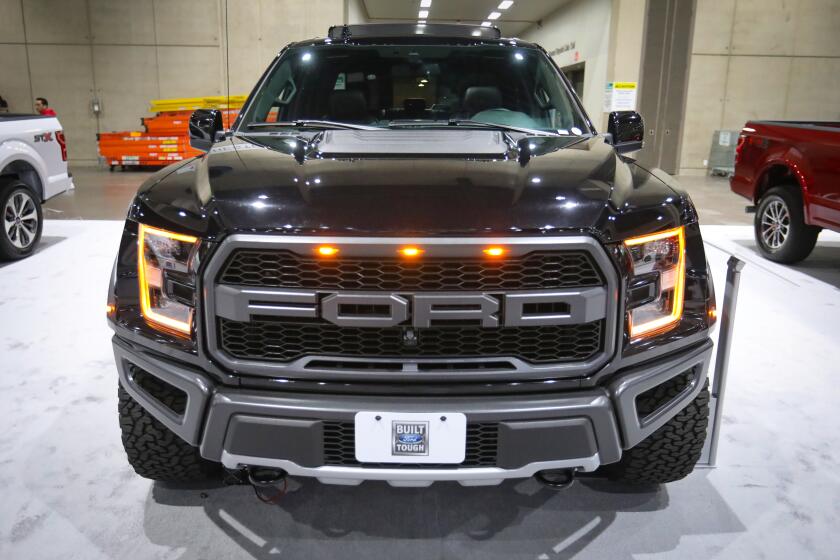With gas prices sky-high, some would-be EV buyers are getting creative
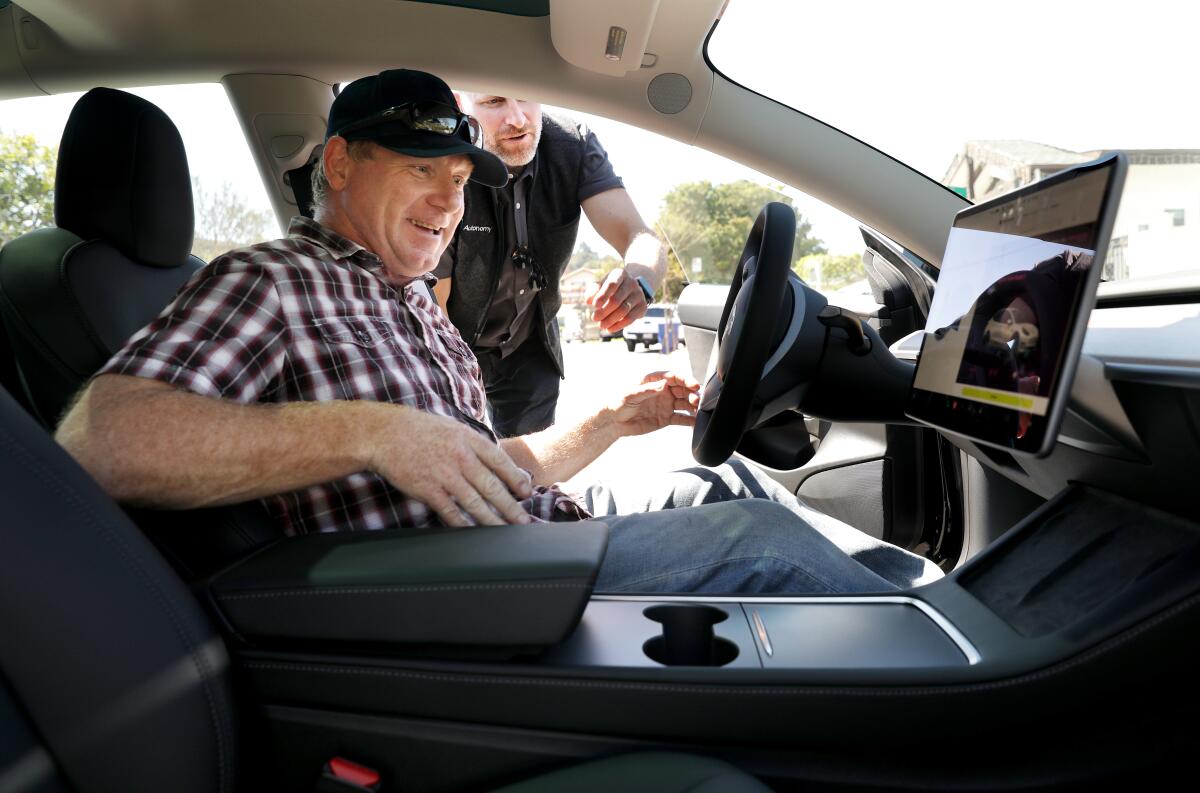
- Share via
Until the car keys were in her hand, Bonnie Velasquez was worried she might have stumbled into some kind of electric vehicle scam.
Velasquez was tired of waiting for Tesla to build the Model 3 EV she had ordered but was turned off by prices for used Model 3s that were as high or higher than for new ones. So how could a Santa Monica startup named Autonomy tell her that all it needed for approval was her driver’s license?
Then it got even more interesting, Velasquez said. Within a day of that approval, she was told to come pick up her new Model 3 at a nondescript parking garage. Amid a bunch of shiny new Tesla Model 3s was a gray one with a pink bow on it. That one was hers, Velasquez was told.
“I didn’t even know how to open the door. I had never even driven a Tesla,” she said. “So they showed me how, let me drive it a little bit. Then they sent me on my way.”
What Velasquez experienced is a vast departure from the traditional buy-or-lease route taken by nearly all car shoppers. Instead, she used a subscription service to get the new EV, essentially renting a car owned by Autonomy for a monthly fee, of $490, in Velasquez’s case, a little less than a direct lease from Tesla.
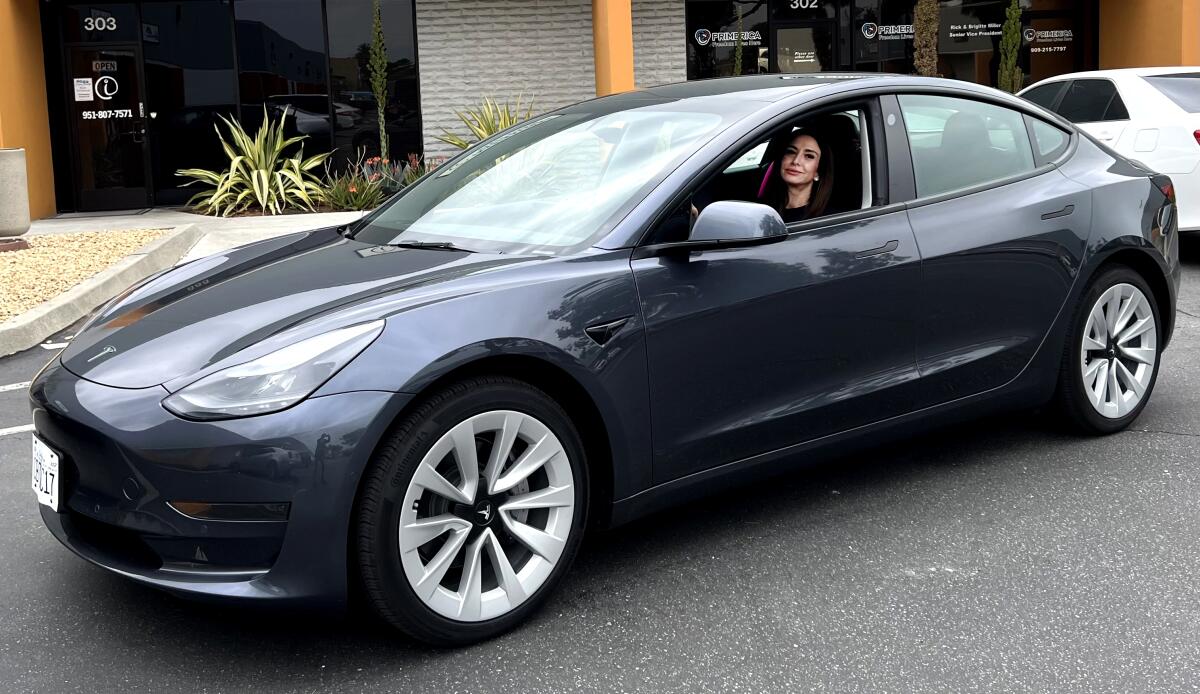
What should be a golden moment for EVs may be passing the industry by. Six-bucks-a-gallon gasoline ought to translate into a sharp rise in buyer interest in electric cars and trucks, right?
Indeed, it has.
Too bad dealers don’t have enough electric cars and trucks available to meet the surging demand.
“There’s just not the availability for any kind of vehicle — especially EVs,” said Brian Maas, president of the California New Car Dealers’ Assn.
EV seekers confess to all sorts of unusual tactics to land a vehicle, such as haunting multiple waiting lists or scouring remote dealerships for overlooked EVs.
Some drivers, such as those with the Chevy Bolt, have seen their leases expire without any new Bolts available to replace them.
“There’s a supply shortage of cars in general. That won’t shock you, but it’s more so for EVs,” said Joel Levin, executive director at Plug In America, a nonprofit advocacy group.
Sales of ever-larger pickup trucks have been keeping the U.S. auto industry flush in recent years. Now gas that can top $6 per gallon is changing the math around owning one.
“That’s because of the price of gas being so high that the demand for EVs has kind of spiked right now,” Levin said, adding that supply chain problems aren’t going away soon. “What I’ve heard from the OEMs [original equipment manufacturers] is that we’re probably in it through the end of the year, at least.”
That’s potential revenue lost and a missed opportunity for electric cars to gain serious traction in a country that still overwhelmingly prefers motor vehicles powered by liquid fuel internal combustion engines.
“Gas prices hit at an awkward time,” said Jessica Caldwell, analyst at Edmunds. Car buyers, facing near-record gasoline prices at a time of extreme inflation with little idea how long such conditions will last, began taking electrified cars more seriously, according to Edmunds data. Cars.com tweeted that since late February consumer interest in EVs, based on website visits, increased 173%.
But that interest probably won’t translate into a significant increase in EV and plug-in hybrid sales, Caldwell said, because too few cars are available for immediate sale.
Computer chip shortages and supply chain bottlenecks have created an inventory drought at auto dealerships across the country — and around the world. Jaw-dropping price increases have resulted from the supply-and-demand imbalance. The average vehicle selling price in August 2020 was about $38,000, according to Kelley Blue Book; in February 2022, $46,085.
Electric car customers are often put on waiting lists that can stretch for weeks or months, and some dealers who do have cars in stock are marking up the sticker price by thousands of dollars. Some California dealers are adding $8,000 to the approximately $50,000 sticker price for the new Kia EV6 crossover.
In their own words, former Tesla employees describe what they call a racist work environment that led California to file a civil rights lawsuit against the company.
Tesla has raised the base price of its Model 3 by $8,500, to $48,440 and Rivian boosted the tag on its new pickup truck by $12,000, to nearly $80,000. Both companies blamed rising costs due to inflation.
Even before the chip and supply chain problems, though, electric vehicle production was limited for any carmaker not named Tesla. The biggest reason that Tesla dominates the electric car industry is its huge head start in addressing the market. The company made appealing, longer-range, fun-to-drive cars when traditional automakers were trying to sell what critics called souped-up golf carts, with little effect on the marketplace outside places such as Santa Monica and Berkeley.
Tesla has been the only vehicle manufacturer to actually increase production compared with a year ago. For now, it’s the company that Autonomy is depending on for its EV supply.
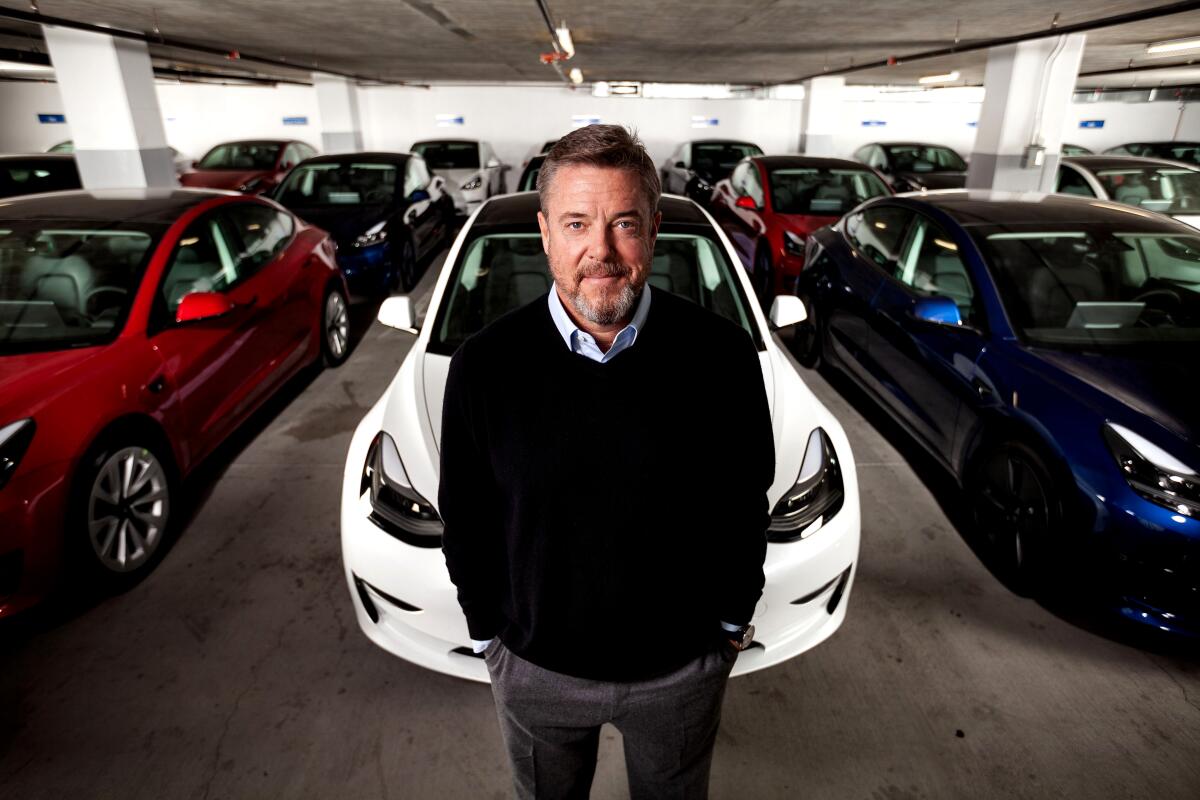
Therein lies a caveat for people who might be interested in trying the subscription service because the only vehicle Autonomy is handling is the Tesla Model 3. Although Autonomy has a goal of acquiring 10,000 of them by the end of 2022, Autonomy co-founder Scott Painter said, no other Teslas are currently available to Autonomy, and the base model is the only one customers can get, not the long-range or performance versions.
Another caveat: Autonomy buys Teslas that customers have given up waiting for, which means choices are limited.
“Tesla has an interesting relationship with its customers. You can put down a deposit, have them build you a car, and then you can renege on your deposit up to and until the day you take delivery. Those are the cars we are buying at the MSRP,” Painter said.
“We’re not jumping the line ahead of anyone and taking their car,” he said. “The only thing we did is go to Tesla and say, ‘We don’t care what color, what tire and wheel package or what battery package you have, we’ll just buy it if it falls out of production.’”
In terms of production, the rest of the industry is only now beginning to catch up to Tesla with cars that carry more wide appeal, such as the Hyundai Ioniq 5, the Kia EV6 and the Ford Mustang Mach-E. On the luxury end, Polestar and Lucid brand cars and Rivian brand trucks are available, but with a waiting list.
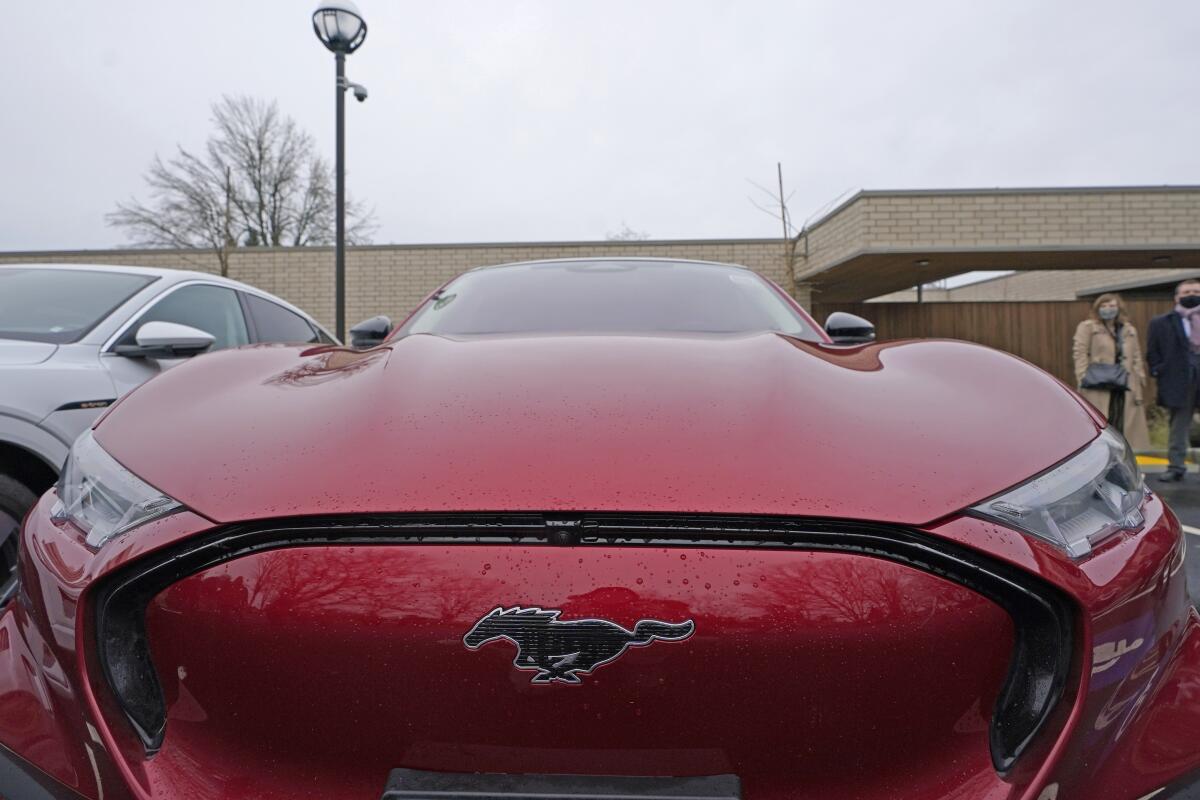
Other vehicles are in the near-term pipeline, including the Ford F-150 Lightning pickup truck, the Volkswagen ID Buzz minivan and the Cadillac Lyriq luxury crossover EV.
“The Lyriq is coming, but it’s not on the street yet. The Mach-E is out on the street, but they’re not making 10,000 of them [a month], they’re making a few thousand,” Maas said.
If supply weren’t a problem, early 2022 might have marked an inflection point for the auto industry — similar to 1973, when Mideast conflict and surging oil prices turned the American public on to small, fuel-efficient cars, giving Japanese models from Nissan, Honda and Toyota entree to the U.S. market, and forcing American automakers to, grudgingly, offer downsized cars of their own.
If gas prices remain high and supply problems are fixed, “the potential is there” for another major shift, Maas said. But those are big ifs.
With pickups outselling passenger cars in the U.S., Ford is betting big on the proposition that lovers of big, noisy trucks can be sold on the virtue of electric motors.
Spencer Purves of Hudson, Ohio, is taking a big plunge into EVs. He’s ordered a new Ford F-150 Lightning, and he’s shopping for an EV replacement for his wife’s aging Prius.
“My wife commutes 75 miles a day,” he said. “We did the numbers and we can buy two electric cars, rent a car for multi-state vacations” and still save money on fuel.
His Ford dealer didn’t add a markup to his Lightning order, but as he shops for the other car, he’s finding supplies are short and many dealers are marking up prices. He’s got his eye on a Hyundai Ioniq 5 crossover. But he’s in no rush. “Hopefully, supply will pick up at some point.”
While new EVs and plug-in hybrids are in short supply, traditional hybrids, which improve gas mileage with a battery and electric motor but don’t have to be plugged in, may be easier to find, especially in the used-car market.
“People don’t have to go full battery electric. People are increasingly considering hybrids as a bridge strategy,” Caldwell said. Older, lower-range, less powerful, but well-reviewed cars such as the Nissan Leaf populate used-car lots at (relatively) bargain prices.
Signing up for monthly usage through Autonomy or similar subscription services is another bridge strategy.
One Autonomy customer who made a huge lifestyle change is Brian Pennington of Torrance, a 53-year-old self-professed country boy who said big pickup trucks have been his standard for many years. The latest is his 2018 Ram 1500 with a whopping 5.7-liter HEMI engine.
But he’s been filling up two or three times a week because of his job as a construction site safety manager. Gasoline prices made him reach for a solution he’d never considered before.
“The last time I filled up was $137, I’m not lying to you,” Pennington said. “I got so mad the last time I filled up. ... I said, ‘I don’t care what it is. I’m going to get an electric car.’”
The change, he said, has been overwhelming.
Most people don’t buy a home with a 20% down payment. Here’s how you can put down less and get more help with down payment and closing costs.
“I’ve had a truck my entire life. Getting used to something this new for me is unbelievable.”
For Velasquez, what was unbelievable was getting her hands on a new Tesla at a time when forces are conspiring to make EVs more desirable and harder to get than ever.
Driving off with hers, she said, “I felt like I was stealing something.”
More to Read
Inside the business of entertainment
The Wide Shot brings you news, analysis and insights on everything from streaming wars to production — and what it all means for the future.
You may occasionally receive promotional content from the Los Angeles Times.
